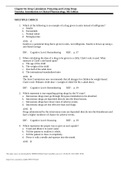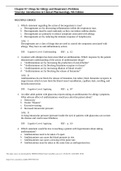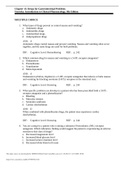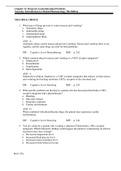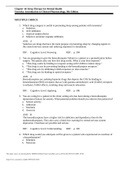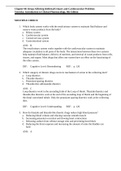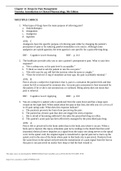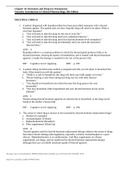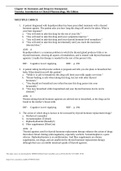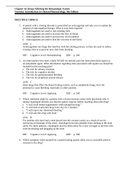Marshalltown Community College
Latest uploads at Marshalltown Community College. Looking for notes at Marshalltown Community College? We have lots of notes, study guides and study notes available for your school.
-
75
- 0
-
1
All courses for Marshalltown Community College
Latest notes & summaries Marshalltown Community College
1. Which of the following is an example of a drug given in units instead of milligrams? a. Insulin b. Furosemide c. Normal saline d. Nitroglycerine ANS: A Insulin is a parenteral drug that is given in units, not milligrams. Insulin is drawn up using a unit-based syringe DIF: Cognitive Level: Remembering REF: p. 37 2. When calculating the dose of a drug to be given to a child, Clark’s rule is used. What measure is Clark’s rule based upon? a. The age of the child b. The weight of t...
MULTIPLE CHOICE 1. Which statement regarding the action of decongestants is true? a. Decongestants act by decreasing inflammation within the respiratory tract. b. Decongestants must be used cautiously as they can induce asthma attacks. c. Decongestants act primarily to reduce symptoms associated with allergy. d. Decongestants act by reducing the immune response of lymphocytes. ANS: C Decongestants are a class of drugs that are used to control the symptoms associated with allergy. They ha...
Chapter 13: Drugs for Gastrointestinal Problems Vislosky: Introduction to Clinical Pharmacology, 9th Edition MULTIPLE CHOICE 1. What types of drugs prevent or control nausea and vomiting? a. Antiemetic drugs b. Antimotility drugs c. Antidiarrheal drugs d. Ant propulsion drugs ANS: A Antiemetic drugs control nausea and prevent vomiting. Nausea and vomiting often occur together, and the same drugs are used for both problems. DIF: Cognitive Level: Remembering REF: p. 242 2. Which common...
Chapter 13: Drugs for Gastrointestinal Problems Visovsky: Introduction to Clinical Pharmacology, 9th Edition MULTIPLE CHOICE 1. What types of drugs prevent or control nausea and vomiting? a. Antiemetic drugs b. Antimotility drugs c. Antidiarrheal drugs d. Antipropulsion drugs ANS: A Antiemetic drugs control nausea and prevent vomiting. Nausea and vomiting often occur together, and the same drugs are used for both problems. DIF: Cognitive Level: Remembering REF: p. 242 2. Which common drug for na...
Drug Therapy for Mental Health Visovsky: Introduction to Clinical Pharmacology, 9th Edition MULTIPLE CHOICE 1. Which drug category is useful in promoting sleep among patients with insomnia? a. Sedatives b. ACE inhibitors c. Atypical antipsychotics d. Selective serotonin reuptake inhibitors ANS: A Sedatives are drugs that have the main purpose of promoting sleep by changing signals in the central nervous system and reducing responses to stimulation. DIF: Cognitive Level: Knowing REF: p...
1. Which body system works with the renal/urinary system to maintain fluid balance and remove waste products from the body? a. Biliary system b. Cardiovascular system c. Central nervous system d. Gastrointestinal system ANS: B The renal/urinary system works together with the cardiovascular system to maintain adequate circulation to all parts of the body. The interactions between these two systems help maintain fluid balance, delivery of nutrients, and removal of waste products from cell...
1. What types of drugs have the main purpose of relieving pain? a. Anticholinergics b. Antagonists c. Analgesics d. Agonists ANS: C Analgesics have the specific purpose of relieving pain either by changing the patient’s perception of pain or by reducing painful stimulation at its source. Although some analgesics are opioid agonists, the term agonist is not specific for a pain-relieving drug. DIF: Cognitive Level: Knowing REF: p. 213 2. The healthcare provider asks you to rate a patie...
1. A patient diagnosed with hypothyroidism has been prescribed treatment with a thyroid hormone agonist. The patient asks you how long this drug will need to be taken. What is your best response? a. “You will need to take this drug for the rest of your life.” b. “You will need to take this drug until your symptoms improve.” c. “You will need to take this drug until your thyroid hormone level normalizes.” d. “You will need to take this drug incrementally until you reach the ma...
1. A patient diagnosed with hypothyroidism has been prescribed treatment with a thyroid hormone agonist. The patient asks you how long this drug will need to be taken. What is your best response? a. “You will need to take this drug for the rest of your life.” b. “You will need to take this drug until your symptoms improve.” c. “You will need to take this drug until your thyroid hormone level normalizes.” d. “You will need to take this drug incrementally until you reach the ma...
1. A patient with a clotting disorder is prescribed an anticoagulant and asks you to explain the purpose of anticoagulant therapy. What is your best response? a. Anticoagulants are used to lyse existing clots. b. Anticoagulants are used to increase the flow of blood. c. Anticoagulants are used to prevent new clot formation. d. Anticoagulants are used to thin the viscosity of the blood. ANS: C Anticoagulants are drugs that interfere with the clotting process, so they are used to reduce ex...

